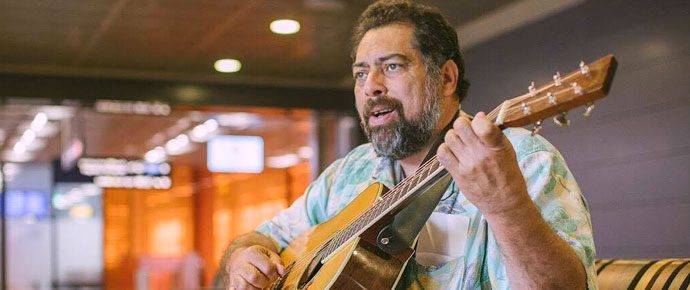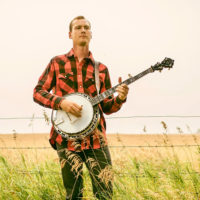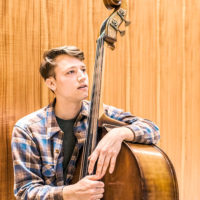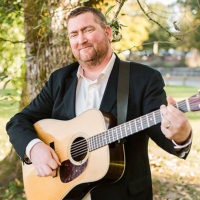
Greg Blake, five times SPBGMA Guitarist of the Year, nominee for IBMA Male Vocalist of the year, and long time member of Jeff Scroggins and Colorado, has a new band called Real Country. Greg, originally from West Virginia and now based out of Kansas City, shared plans for the band, their upcoming schedule, and answered a few questions.
Tell us about your new Real Country project. How did it come about, how is it different from the GB Band, what material will you be playing, originals, covers etc…
Well, Dave, I’ve been listening to, and singing country music as long as I can remember. That was the first music with which I fell in love. Country music from the radio or the turntable was constantly playing in my childhood home. So as I played with my Tonka trucks and action figures as a small boy, I learned the words and melodies to the songs of Cash, Jones, Haggard, and Frizzell. And even as I turned my interests more toward bluegrass, I still loved the country songs and artists of the ’50s, ’60s and ’70s. I still include “grassed-up” versions of country songs in my bluegrass set lists. It seems like my audiences really love the “old country” as much as I do!
One night after a house concert in Saskatoon, I was talking to one of the attendees, and he seemed to be convinced that if I’d come up with a set or two of these old country songs accompanied by good acoustic musicians, maybe with some pedal steel guitar, that I’d never have to worry about finding work in the Canadian provinces. I couldn’t get that thought out of my head. I had recently toured in Ireland and recalled how crazy the audiences went when I started into I Still Miss Someone or Oh Lonesome Me or Together Again, so it didn’t take much to convince myself that there would be receptive audiences in the US too. It was confirmed for me one night at a bluegrass festival in Florida when the promoter pulled me and Darrell Webb aside and said I’d like for you to do a Buck Owens tribute some night. We put it together and the folks ate it up! I’ve been wanting to do more of it ever since.
I told a few musicians who share my enthusiasm for classic country and they said “We’re in!” Right now, I’m calling it Greg Blake & Real Country because in another late night conversation someone told me “… today’s country isn’t real country – bluegrass is today’s real country …” and that phrase “real country” resonated with my love of both bluegrass and classic country. The band includes Miles Zurawell from Victoria, BC on banjo, dobro, and pedal steel; Isaac Callender on fiddle, mandolin, and a little bit of Telecaster; and Nico LaRoche-Humby rounds out the band on acoustic and electric bass. All of the fellas are great singers, too. At first, we’ll be doing a lot of covers, but I’m beginning to write more and a couple of the other fellas are already churning out songs.
Will your other projects continue or go to the back burner?
The focus of my attention for the last almost ten years has been working alongside Jeff and Tristan Scroggins to establish Jeff Scroggins & Colorado (JSCO) as a top-tier, national and international touring band. Last year, we felt pretty affirmed in our efforts when we were one of the nominees for IBMA Emerging Artist of the Year, and the year before that were actually awarded that same honor by the California Bluegrass Association. When JSCO first started, all five original member resided in the Front Range of Colorado. Today, after a handful of personnel changes, not one of the five band members lives in Colorado; Vancouver, Nashville, Kansas City, Portland, and Edmonton are home to this hard-working, international touring ensemble. Since we are so spread out and each member is pursuing other projects, our 250+ day-a-year schedule has diminished considerably. We are still performing at festivals and concert series around the globe, just at a considerably less rigorous pace.
As for other projects that I’ve been working on … when I moved to Kansas City, I established a Midwest-based band to play the small festivals of Kansas, Missouri, Arkansas, and Iowa and be a support to the area that had been formative in my musical development. That band continues to receive requests from festivals and concert series in the Midwest, and we’ll keep that going. I also recently completed a three-week solo tour of Ireland that was great. That’s the first time I’ve been responsible for that many sets as a solo performer! And since the release of my debut solo album Songs of Heart & Home in 2015, I’ve toured that album in Ireland and Canada with a few of the artists that helped me with it – Blaine Sprouse, John Reischman, Sally VanMeter, and Mark Schatz. I continue to get requests for that configuration or something similar. So, it looks like I’m going to remain busy – hopefully – for my bill collectors’ sake, lol – with a varied offering of configurations. I love to share my music with folks, in whatever way and with whoever they like to hear with me!
Do you have any new things you want to try out with this band?
I would love to take this band into some of the situations where a ‘traditional bluegrass band, per se’ isn’t really what the talent buyer may be looking for. I can see bringing this band into a small rural town that loves to come out and hear top-tier talent without having to drive into the big city or pay an enormous amount to enjoy it. When they get to the show, we’ll give them a little bit of bluegrass, a little bit of folk, a little bit of country, a little bit of Gospel, a few original tunes and a lot of entertainment value for their admission. I’d love to come to a bluegrass festival that might be open to attracting a few extra country fans into their seats and help with the bottom line a little bit.
Where would you like it to ultimately take this?
The guys that are committing to this project are great musicians. I’d love to see them be recognized as such in due time. If this experiment proves to be successful, perhaps it can serve as a model for other artists and venues. I see a handful of festivals hiring acts that aren’t strictly bluegrass in order to attract more people through the gates. Also, I’d like to broaden out a little bit and bring my mixture of bluegrass and traditional country to more eclectic music festivals that have a variety of roots, folk and Americana lineups.
Do you see this as more of the same in terms of aggressive touring or an opportunity to slow down a bit and play more locally?
The Midwest-based band is designed for playing locally in Kansas, Missouri, Arkansas, and Iowa. I plan to continue blazing a trail and traveling full time between this band, solo shows, and occasional high-powered collaborations.
Though I’m sure some purists might disagree, country and bluegrass have always been joined at this hip so it doesn’t seem like a big deal you are promoting Real Country as playing both. Lester Flatt being a great example, what’s your take?
I definitely don’t see the two as synonymous, but they are close kin! As far as I can tell, before Monroe’s music was labeled bluegrass it was under the umbrella of country. It was only after certain folks in Nashville tried to compete with rock and roll and other popular music during a particular era that bluegrass was orphaned. Bluegrass handled the separation just fine and it has matured to the point where it’s at another evolutionary crossroads. When at crucial junctions in life, it’s always a good idea to remember where you come from. I don’t foresee a ton of contemporary country folk flocking to our shows, but I think there will be a surprising amount of listeners who will appreciate what we’re trying to do and respond, “Now THAT’S real country right there!”
How would you describe the differences or similarities of singing styles, harmonies, etc. between bluegrass and country. I mean, Bill, Jimmy, and Ralph are noticeably different from Hank, Merle, and Buck.
Well, in both country and bluegrass the melody lines and corresponding harmony lines are for the most part simple and delivered with heartfelt conviction, especially those lyrics that drift to the melancholy and maudlin side. Where country and bluegrass singers diverge, in my opinion, is in “edginess” in nearly every case, and also in tonal quality and technique. There are a lot of great bluegrass singers today whose tone, technique, control, and delivery would be welcome in any other singer-driven genre. But the major area where the two differ is that edge that a good traditional bluegrass singer brings to the stage and studio. They’re right on the cusp of their vocal range in choosing the key, giving their voice that strident — but not strained timbre; nobody wants to hear a dog a-hollerin’ after he’s gotten his leg caught in a barbed wire fence quality that pushes us to the edge of seats with the anticipation of whether she or he is going to pull this off. Most of the time, a country singer is going to sing their song in a key that’s going to allow for warmer, rounder tones with a little more breath in the lyrical phrases. There’s also a respectful nod to the phrasing and vocal ornamentation of the patriarchs — Monroe, Lester, Carter, Ralph, Jimmy, etc — that gives you the assurance that they’ve been listening to some of the same records you have. And whether or not the bluegrass singer delivers the package with a southern or Appalachian affectation, she or he still sings like they talk, and wants you to hear the message of the song more than the messenger.
Thanks Greg, I think this is a great band name and look forward to hearing you all put some “real country” back into the mix.
Thanks so much! Look forward to seeing you again real soon!
Thanks to copy editor Debbie Benrubi.










